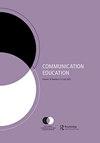展示我们的伤口,治愈纪律:沟通有效性问题
IF 0.8
Q3 COMMUNICATION
引用次数: 0
摘要
论坛呼吁的核心问题是,我们是如何伤害自己的?首先,我们希望探究这门学科的价值以及它所赋予学者的价值。通过定义我们的价值,我们能够看到我们造成了什么伤害;通过确定我们的价值,我们可以恢复我们的纪律健康,恢复我们的身份和目标。我们认为,由于忘记了我们是谁,纪律已经伤害了自己。它失去了对沟通有效性的理解,尤其是在评估基础沟通课程时。由于评估实践影响了沟通教育(Morreale,2020),对我们评估措施有效性的担忧使该学科面临进一步的伤害。对学科评估措施的仔细检查表明,结构有效性继续被我们忽视,当这种忽视被发现时,个人和机构将被追究责任。定义、教学和衡量沟通效果是社会对该学科的期望。为了确保我们的学科健康,我们必须重新定义什么是有效的沟通,以及我们如何在日益多样化的背景下评估它。该学科的形成是因为它为高等教育带来了独特的东西,尤其是口语交际训练本文章由计算机程序翻译,如有差异,请以英文原文为准。
Presenting our wounds, healing the discipline: the problem of communication effectiveness
The central question of the forum call is, how have we harmed ourselves? To begin, we wish to explore the discipline ’ s value and the value given to its scholars. By de fi ning our value, we are able to see what harm we have caused; by determining our value, we can restore our disciplinary health and reclaim our identity and purpose. We argue the discipline has harmed itself by forgetting who we are. It has done that by losing its understanding of communication e ff ectiveness, especially in the assessment of the foundational communication course. As assessment practices have impacted communication education (Morreale, 2020), concerns about the validity of our assessment measures leave the discipline open to further harm. Close examination of the discipline ’ s assessment measures demonstrates that construct validity continues to slip our grasp, and when this slippage is discovered, individuals and institutions will be held accountable. De fi ning, teaching, and measuring communication e ff ectiveness is a value that society expects from the discipline. To ensure the health of our discipline, we must rede fi ne what e ff ective communication is and how we can assess it within increasingly diverse contexts. The discipline was formed because it brought something unique to higher education, particularly oral communication training
求助全文
通过发布文献求助,成功后即可免费获取论文全文。
去求助
来源期刊

COMMUNICATION EDUCATION
EDUCATION & EDUCATIONAL RESEARCH-
CiteScore
3.10
自引率
34.80%
发文量
47
期刊介绍:
Communication Education is a peer-reviewed publication of the National Communication Association. Communication Education publishes original scholarship that advances understanding of the role of communication in the teaching and learning process in diverse spaces, structures, and interactions, within and outside of academia. Communication Education welcomes scholarship from diverse perspectives and methodologies, including quantitative, qualitative, and critical/textual approaches. All submissions must be methodologically rigorous and theoretically grounded and geared toward advancing knowledge production in communication, teaching, and learning. Scholarship in Communication Education addresses the intersections of communication, teaching, and learning related to topics and contexts that include but are not limited to: • student/teacher relationships • student/teacher characteristics • student/teacher identity construction • student learning outcomes • student engagement • diversity, inclusion, and difference • social justice • instructional technology/social media • the basic communication course • service learning • communication across the curriculum • communication instruction in business and the professions • communication instruction in civic arenas In addition to articles, the journal will publish occasional scholarly exchanges on topics related to communication, teaching, and learning, such as: • Analytic review articles: agenda-setting pieces including examinations of key questions about the field • Forum essays: themed pieces for dialogue or debate on current communication, teaching, and learning issues
 求助内容:
求助内容: 应助结果提醒方式:
应助结果提醒方式:


